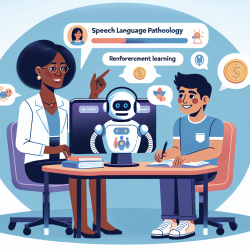Introduction
In the dynamic field of speech-language pathology, the integration of data-driven strategies is essential for optimizing outcomes, especially for children. A recent study titled "Strategies to improve the implementation and effectiveness of community-based psychosocial support interventions for displaced, migrant and host community women in Latin America" provides valuable insights that can be adapted for practitioners working with children. This blog explores how these strategies can be applied to enhance online therapy services, particularly in school settings.
Key Strategies for Implementation
The study identified five core strategies that significantly improved the implementation and effectiveness of psychosocial interventions. These strategies can be adapted to the context of children's therapy to create impactful results:
- Stakeholder Engagement: Actively involving community leaders, parents, and educators in the design and implementation of therapy programs ensures that interventions are aligned with the community's needs and priorities.
- Promoting Adaptability: Customizing interventions to fit the unique needs of each child and their environment is crucial. This involves being flexible with therapy formats, whether in-person, online, or hybrid.
- Group and Community-Based Delivery: Implementing therapy in group settings can foster peer support and enhance social skills among children, while community-based delivery ensures accessibility.
- Task Sharing: Training community members or paraprofessionals to assist in delivering interventions can expand the reach and sustainability of therapy programs.
- Providing Incentives: Offering incentives, such as recognition or small rewards, can motivate both facilitators and participants to engage consistently in therapy sessions.
Applying These Strategies to Online Therapy for Children
Online therapy services, such as those provided by TinyEYE, can benefit from these strategies by enhancing engagement and outcomes. Here's how:
- Enhanced Engagement: By involving parents and teachers in the therapy process, children receive a supportive network that reinforces the skills learned during sessions.
- Customizable Sessions: Online platforms allow for easy adaptation of therapy materials to suit individual children's needs, promoting a more personalized learning experience.
- Group Interaction: Virtual group sessions can be organized to encourage interaction and social learning, which are vital components of child development.
- Community Involvement: Training school staff or community volunteers to facilitate online sessions can help maintain program momentum and ensure continuity.
- Motivational Incentives: Incorporating gamified elements and rewards in online sessions can increase children's motivation and participation.
Encouraging Further Research
While the study provides a robust framework for enhancing psychosocial interventions, ongoing research is necessary to refine these strategies further. Practitioners are encouraged to contribute to this body of knowledge by documenting their experiences and outcomes, thereby advancing the field of speech-language pathology.
To read the original research paper, please follow this link: Strategies to improve the implementation and effectiveness of community-based psychosocial support interventions for displaced, migrant and host community women in Latin America.










